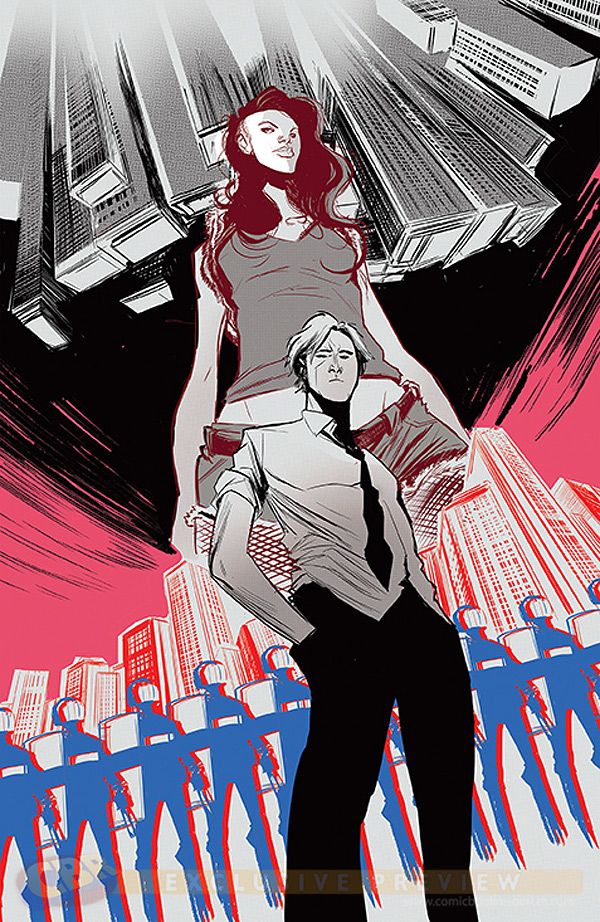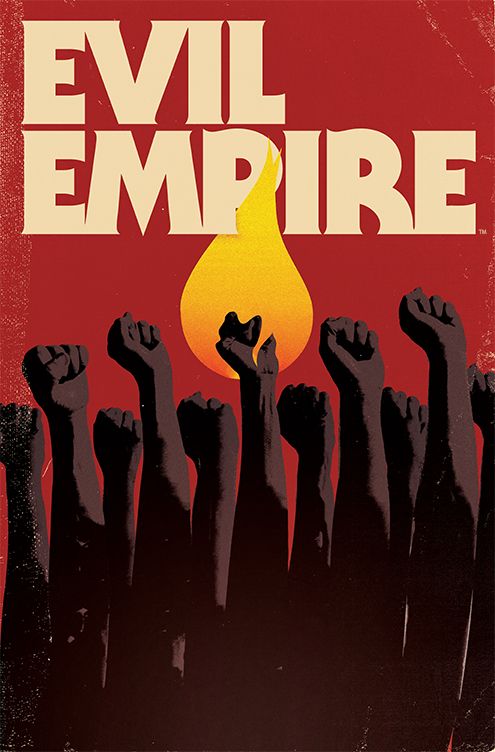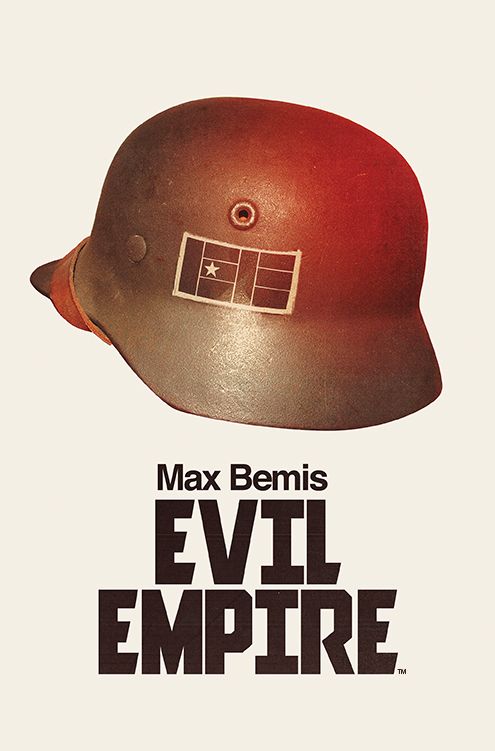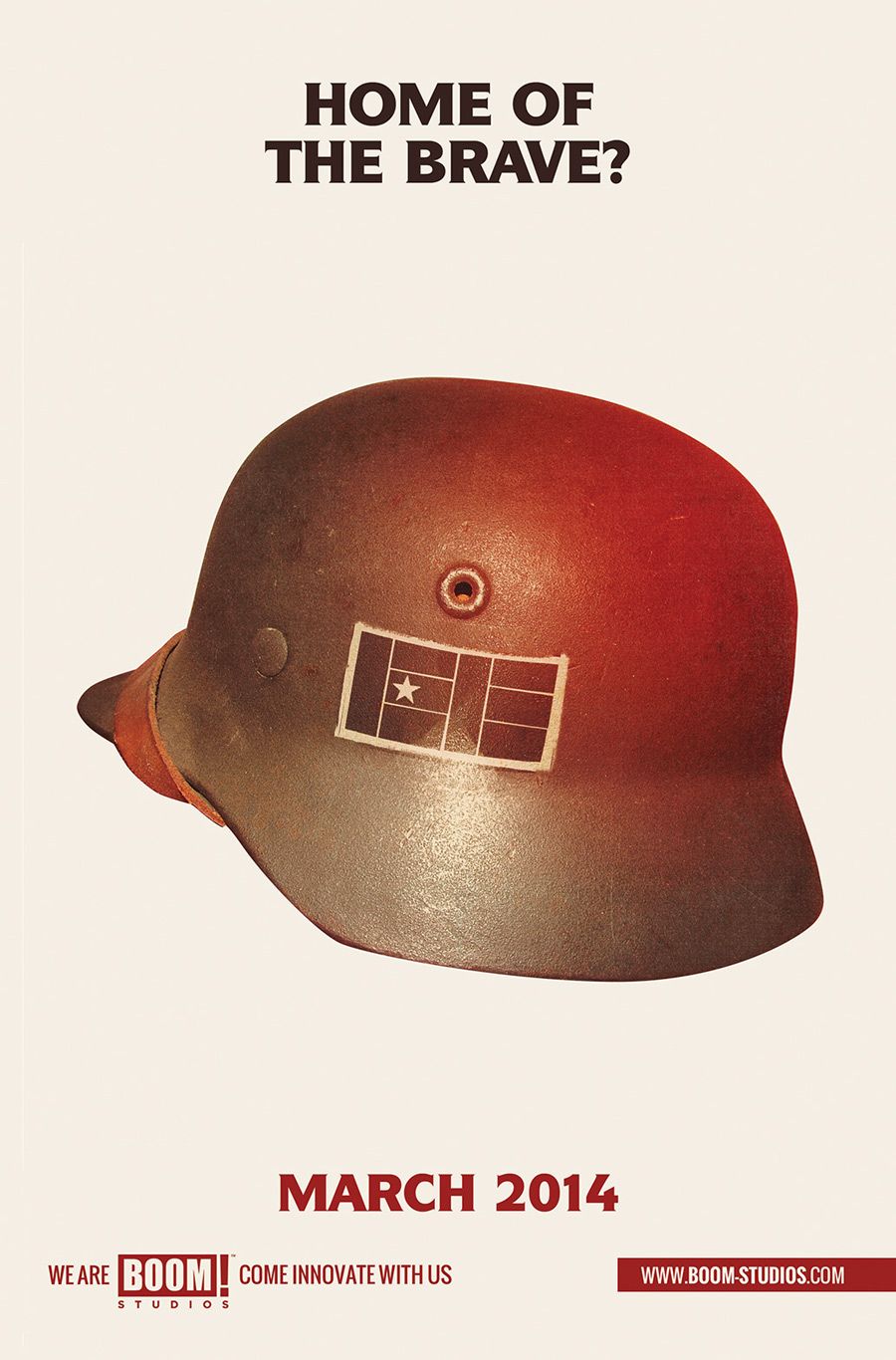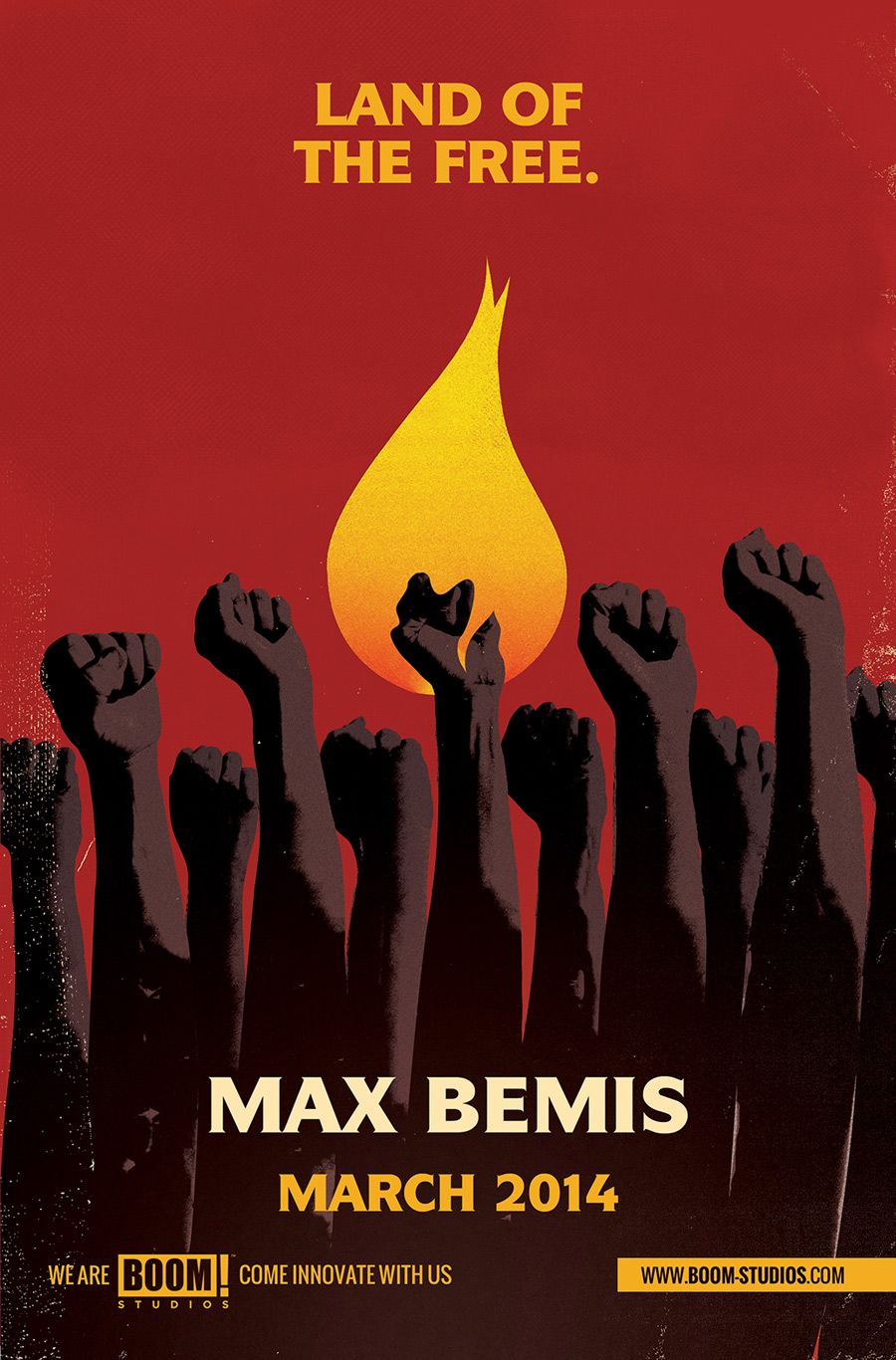Max Bemis is fighting the power with his next comic "Evil Empire." The Say Anything frontman and "Polarity" writer returns to BOOM! Studios with a 16-issue maxi-series launching on March 5. The series finds a controversial rapper named Reese rising up to fight a growing menace that threatens to turn a world very much like our own into the type of oppressed society found in numerous sci-fi tales.
Rather than the approach taken by "Star Wars" or "The Matrix," where the huge, all-powerful evil organization is already in power, Bemis and artist Ransom Getty kick off "Evil Empire" much earlier in this time frame, showing its rise from the beginning. The series' heroine, Reese, is right there too, watching her reality shift and crumble, all as she finds herself getting involved thanks to as yet unrevealed personal reasons.
Bemis took some time during his current Say Anything tour to give CBR News the exclusive first interview about "Evil Empire," laying out some of the creative and real-life influences that inspired this dark look at an alternate world. He also discussed Reese's involvement in opposing the growing empire and how his comic writing process has evolved since debuting in the industry last year.
CBR News: Let's get a few "Evil Empire" basics out of the way, right off the bat. How long will the series run?
Max Bemis: It's kind of like a maxi-series, one could say. I think it's a 16 issue run, or at least that's the goal. That's how I plotted it out and that's our intention for the book.
When you're figuring out a story with that many issues, do you make detailed plots for each issue or plan arcs ahead of time?
I do the beats for each issue later on. We ended up summarizing all the major plot points in the entire series. Right now, we're just in the first arc. The way that I wanted to approach the series is by plotting the beats of each arc as we get to it rather than have the beats for the entire series. Even with "Polarity," where I had limited experience, it was such a short series that it wasn't needed. I enjoyed that, if I had a crazy idea that might throw the whole thing out of whack -- assuming we were all on the same page about it -- I could just do it at a moment's notice.
I really wanted to preserve some of that opportunity to do things totally differently if I decide to, despite the fact that we have planned out the main beats for the whole series. Even as we've been working on the beginning of the book, a lot of new stuff has come to light in different ways and I predict that's the way it's going to go the whole way.
In addition to writing comics, you're also on tour and writing music. Do you have a writing schedule set up, or do you just write when the idea hits?
With comic writing, I've found I work best just doing it all at once when it comes to a first draft. It's pretty rare where I sit down and do a little bit of writing every day, which is a big writer no-no. It's the fact that I'm only writing one book right now that makes that possible. I tend to get really excited about something and write it all in one night, then I go through it in editing. I'd rather harness my outpouring of energy.
Say Anything Lead's Max Bemis Talks Comics, "Polarity" with CBR TV
It also has to do with having a pretty busy schedule outside of comics. More importantly, it's because that's how I enjoy doing it. It all spills out at once, usually one issue at a time for a first draft. Technically, it doesn't even take that much of my time until I start editing it, where you're going back and forth with the editorial team. Who knows, if I get to do this more and get to work on more than one book a month, I'm sure it will be necessary to budget my time a little better. As of now, it works.
"Evil Empire" stars a rapper named Reese. What can you tell us about that character and what made her the right focal point of the story?
To be honest, it wasn't her occupation as a rapper that initially attracted me to the idea of having her be the main character. I just wanted to write a character in the context of the story that works as the moral centerpiece. My benchmarks for the series are my favorite Vertigo books of all time, like "Preacher," "Scalped" and "Y: The Last Man," stuff like that. Every one of those series has this moral anchor.
My last book, "Polarity," had a main character who was basically a bastardized version of myself, like Woody Allen in a Woody Allen movie, or when he casts other actors to play himself. [For "Evil Empire,"] I decided I wanted to take someone from a completely different background with a very different personality. She's very rough on the outside and can be vulnerable on the inside. That's not really me. I'm kind of a big softy all around.
When I was thinking about an occupation that would have her relate to the social landscape of what I'm trying to mess around with, musician [came to mind]. Especially someone like Kanye West or Lauryn Hill and how much they reflect and are a part of the culture landscape versus someone like me who kind of flies under the radar in my band. I wanted to write about someone like that. Although she's a musician, she's in a very different position than me. She's politically minded, people are always listening for her to say something controversial and she's kind of a radical. In the context of the plot of the book, she was the perfect person to mess with on a moral level and see what she does.
The book finds Reese going up against the corrupt Evil Empire of the title. Is there a face to them in the early part of the book?
The opposition is something that, as of right now, is going to come organically. You can't have an opposition without the seeds of unrest, or the movement [being planted]. All the groups that acted counter to Nazi Germany wouldn't have had to exist if there weren't Nazis. So, right now, in the first arc, we're examining the growth of the movement itself and the opposition to it.
The basic idea is that we're doing the prequel to every genre movie ever that takes place in a post-apocalyptic world, where an evil empire is ruling the world: "The Matrix," "Star Wars," even if you want to expand a little bit, there's "The Walking Dead," where there's some kind of supernatural force involved. There's always something that has taken over the world, some kind of dark leader, and a smarmy rebel has to come and save the world. This is usually where a lot of movies and comic books start. We thought, "How can you tell the story of our modern society evolving into this megalomaniacal, post-apocalyptic, evil empire?"
One thing I don't want to confuse readers with is, we're not telling the story of anarchy. I am an anarchist, technically, and I don't see anarchy as that bad of a thing. Nor are we telling the story of an extremely right wing government taking over the country. It's also not the liberal complaint that The Man is going to take over the world. This is about true evil throwing away all morality over all spectrums and getting into your baser instincts and letting that be the legal precedent. What would it take for the government to actually become evil?
Reese and her opposition start to grow out of the need to speak against it. She's also deeply connected to it personally in ways that move the plot along and keep her as the centerpiece. She's not just standing on the outskirts like, "I'm going to do something about this," as this random girl. She's actually very involved, from the beginning.
Were there real life occurrences that inspired the political aspects of this story? Or were there specific fictional evil empire stories that made you want to come at the trope from a different angle?
I still love it; it's one of those tropes that doesn't get old and I think I'll always enjoy it. I don't think it's so hackneyed that it needed a parody. It's less so a criticism of the use of that trope and more so a link to my own fears about society. In real life where are we headed as a species? It's taken us all this time to learn not very much about how to deal with each other and the Earth. We're still waging wars, and there's the threat of nuclear war at this point. There's mass genocide. This is usually all performed under the guise of righteousness. The one thing that always scared me is, what if someone in a position of power were to suggest, "Why don't we just throw away the righteousness altogether, if we're doing this anyway?"
I know it's a very far-fetched scenario and that's why it's an entertaining comic book. At the same time, I'm the type of guy who feels that insecurity on these tiny levels, even when I see a guy like -- I hate to pick on him -- but Kanye West. This is a guy who's extremely talented and a great musician, but his ego is insane. He's in this position of power culturally where a lot of people are listening to what he's saying. Every time I see someone like that and they say disappointing, ego-maniacal or amoral stuff, it kind of scares me. Or if I'm at a party and I see some guy being picked on passive-aggressively because someone else wants to feel cool. These things scare and disturb me. They make me wonder about the nature of our society and if humans really just want to fuck each other over. Or, at least, a lot of us. If we were given the freedom to just do whatever the hell we wanted and be dicks and kill and rape and maim, would we do it? I think the sad part is that a lot of people would.
It's got to be something of a release to explore that in this book and maybe process those fears through your writing.
Yeah, completely. The whole thing is such a moral clusterfuck, for a lack of a better term. I'm really getting to explore through these characters why this person makes the choice to align themselves with that person or why this person makes the choice to oppose it. The roots of the movement itself, how could it actually happen? It is really gratifying.
Bemis Makes His Marvel Debut With "A+X" Magneto, Superior Spider-Man Tale
Hopefully this isn't going to happen any time soon, but at the same time, it's also a metaphor for the fact that, on a small level, we let it happen every day when we let go of our weird, otherworldly notion of what's right and wrong. I don't mean in a right wing, "What the Bible says is right or wrong," way, but that thing inside you, your conscious. People let that go every day. I see it every day, and it's a sad thing. To see the evolution of the movement and how it takes control of the world is another way of me being able to look at human nature and see how we can prevent ourselves from doing these kinds of things every day to each other.
"Evil Empire" sounds like a science fiction story that examines modern day society by creating a fictional version that references our own.
Yeah, definitely. It is in that sense, for sure. It's one of those parallel worlds, "Twilight Zone"-ish explorations of a different path that the world could take. It's far-fetched enough to put it in the realm of science fiction.
A lot of what actually influenced the creation and the writing of this book has been a recent obsession with horror films. I don't just mean cheesy horror films, but smarter indie fare and international horror movies. A lot of them focus on the lives of these amoral characters, and you have to see them as more than a cliche. You have to see that sometimes that protagonist is not really the protagonist. It's like this moral ambiguity, this grey area that they play with that shocks people and is really entertaining even though it is dark. This series is a lot darker than "Polarity," which isn't to say that it doesn't have humor or heart -- it's just an examination of possibly the worst aspect of human beings.
What were some of the movies you watched that informed the tone of "Evil Empire?"
There's a movie called "Martyrs," a French film that's ridiculous and really dark. There's a movie called "Kill List," which is a really brilliant British movie. "The Woman," which was made in America by Lucky McKee. He's the guy that did "May," which is another great horror film.
All of these films have maybe one person who's actually a good, decent person, but everyone else is totally gray and ambiguous. How they go about their lives and the choices they make under such harsh conditions, I'm addicted to figuring it out and seeing it unfold. I wanted to do that myself. There's not enough blood and guts in "Evil Empire," but I see it as a horror epic.
Earlier, we talked a little about how you've developed a writing habit of sitting down and knocking out a script. When you first started writing comics, how did you familiarize yourself with the format?
BOOM! sent me a Mark Waid script as a reference. I had some history with screenwriting, so I knew about pacing and all that stuff. All I really needed to know was the actual format of how a script works. Any person who is an obsessive comic fan could script a comic, and they probably don't realize it. Everyone has their own style and there's different levels of decompression and things like that, but if you know what you need to write, you can probably figure out how many panels you need on a page or if a splash is needed. It comes pretty natural if you're as obsessed with comics as I am. It didn't take me long to figure it out. That's not saying that I'm so great at it -- I just read comics non-stop. That, plus the previous screenwriting experience, made it pretty easy to latch onto Waid's format. Thanks, Mark!
Do you work in the full script, write everything out format?
I put everything right on the page, pretty much. I leave certain things open for interpretation, things that I'm interested in collaborating with the artist on. That psychedelic scene in "Polarity," for anyone that read it, where he's losing his mind, I spelled out a few parts of that, but I knew that Jorge [Coelho] would make it his own. There's a couple of sequences like that already with "Evil Empire." I'm getting layouts now, and they look amazing. I think if I had been too specific, they would have suffered.
You're working with Ransom Getty on "Evil Empire." What made him the right artist for the job?
He's amazing. He's done some stuff for Image, [but he's] another kind of new gun. He's really awesome. Very different, tonally, than Jorge. I see him like Lee Bermejo a little bit, where it's definitely realism, but there's a lot of feeling behind it. It's not a boring looking book, it's super-pretty. There's lots of cool looking shadows. It's very vibey and sort of dark. We could have gone with someone who's more quote-unquote indie just to try and fit in with that fad. As much as I love loose visuals and some of my favorite artists are that, it just didn't serve this idea. We wanted it to be really impactful when something happens because you're actually seeing it, like in a film.
You seem to be pretty happy with BOOM!, having appeared in the video they showed at New York Comic Con and returning to them with "Evil Empire." What have the done to keep you with them rather than heading to Image?
To be honest, there are several things. For one, I'm a big fan of the company and the books they put out. They were the first company I ever met with, and they were always supportive, even after we fell out of touch. There was no one as unpretentious as the people at BOOM! -- Ross [Richie], who runs the company, is just the nicest guy you can imagine, and yet he's also extremely successful. That's what I look for in people to do business with. You don't have to be a pushover, but you still have to be a good dude and love comic books, and everyone there does. My editors are great, brilliant people.
COMMENTARY TRACK: "Polarity" #1 With Max Bemis
Frankly, there was a time where I was not sure [about going back to BOOM!] because this is a mature readers book and they don't tend to do that very often. I asked BOOM!, and they said, "No, we want to do everything you want to do." They literally said that to me. That kind of loyalty and dedication, even in theory, is something that really attracts me. I'd rather keep making successful books or music with partners you can trust and build a long term relationship with than kind of scrounging around looking for the newest, coolest publisher. That's not to say that, at some point in my career, if I'm doing this forever I won't do stuff at different publishers, but it's always good to have a home, or some place that you can rely on and build that kind of relationship with. That's definitely BOOM!.
Speaking of working at different companies, you did have a story in "A + X" #14 earlier this year. Do you have any plans to work with Marvel again at this point?
There's no follow-up plans, but I'm very, very interested and, from what I understand, the feeling is mutual. I even told Jordan [White], my editor at Marvel, that I feel like I'll have a lot more to offer in terms of bringing people to a book when I've established myself a little bit more. It's great that "Polarity" did well, but at the same time, as a comic fan, sometimes you want two or three books under a writer's belt before you're willing to trust them with a big take on a Marvel character. Even the best, most successful indie writers who move to Marvel and DC, they all had a track record, experience and a style that people could expect when they do a bigger book.
I'd like to think that after a few more books, or after "Evil Empire," people will be able to associate me with good comics. That's my goal. I'd love to. I'm a geek. I love the people at Marvel. Everyone I've met at DC is cool, too. I definitely am interested in writing those characters more than anything. It's less so about wanting to be some big name, recognized writer and more so about dipping my toe in the continuity of this myth that's been going on for almost a hundred years.
"Evil Empire" #1 from Max Bemis, Ransom Getty and BOOM! Studios hits stores March 5.


